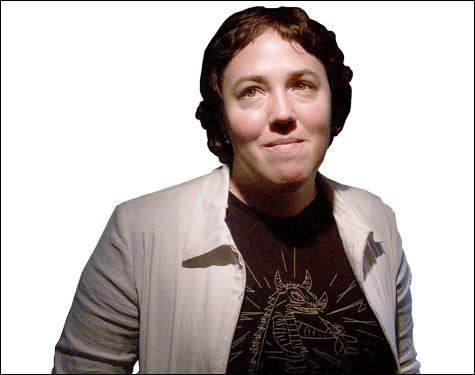
FUNNY AND DARK: Aliens, young love, magic, and summer camp — all are grist for Kelly Link’s mill. |
Salted throughout Kelly Link’s stories, you’ll find Buffy, Bust, Doc Martens, IM-ing, Target, Google, Vicks VapoRub, a T-shirt that reads I’M SO GOTH I SHIT TINY VAMPIRES. But while Link is not an author who shies away from referencing pop- and commercial-culture, nor is she some glib chronicler of the right-now. Her work — realm-straddling blends of fantasy, science fiction, fairy tale, and capital-L literature — possesses a mythic quality. She’s the rare writer who’s able to mix these of-the-moment items, products, and activities with the eternal, the timeless: quests, coming of age, entering a new world, death, and the day-to-day mysteries of being human.
“I am very, very fond of the kinds of fiction that get sort of stuck off in their own separate pens,” says Link over a smoothie on a sunny September morning this past week at Back Bay’s Trident Café, across the street from her now-shuttered former employer, Avenue Victor Hugo Bookshop. “There’s an energy there, and you’re able to break rules in more interesting ways.”
As author of acclaimed short-story collections Stranger Things Happen, Magic for Beginners, and, most recently, Pretty Monsters, Link has the ability to pull readers into her universe, and make them believe, even if only for a moment, in ghosts and zombies and haunted hats, in world-holding handbags, underworld visits, alien abductions, sinister rabbits, young love, and magic.
Writing the fantastic has long appealed to her. “The stories I wrote beginning in college” — she went to Columbia — “have always been stories that had ghosts in them, or gods, or stories that I thought of as fantasy or science fiction, and had elements in them that I felt did not belong with realistic or mimetic fiction. I wanted my fiction to read like mimetic fiction” — capturing the texture of real life — “but I wanted to be able to incorporate all the stuff that I really love as a reader.” In other words, her intent is to create stories that hold a mirror up to the world that we know, as well as toss in some fantastic special effects.
Salon’s Laura Miller, an early and ardent champion of Link’s, claims that Link has a voice unlike any writer she can think of. “She’s fearless about incorporating things that writers at that high level of artistry might be fearful of, like pop-culture, like genre,” says Miller over the phone from New York. “She refuses to see the need to corral that stuff off into a sub-literary area. All of it is grist for her mill.”
Unzipping the rain
The title story of the new collection, Pretty Monsters (which includes a few stories from her first two collections and is, incidentally, being marketed to young adults, though it should appeal just as much to grownups), showcases Link’s habit of nesting stories within stories. It’s partly a tale of a teenage girl named Clementine whose life is saved by a blond-haired boy named Cabell, partly a tale of girls at a private school enacting an initiation rite on one of the new kids, and partly an examination on the act of reading and how stories can be shape-shifters. Plus latent-lesbian urgings. Also: werewolves.
The reason this mad amalgam works is, for one, Link is able to channel teenage-girldom without condescension or over-the-topness. An example: “Grace took over, as if she and Madeline were training for the Olympics in the freestyle unsolicited-advice relay.” It’s amusing and perfectly captures high school, but is also smarter and funnier than any 11th-grader could articulate. And then there are lines with such specificity, so lovely: “There were bats dipping down, as if unzipping the rain.”
More than that, something unnamable in Link’s work hovers right at the edge of consciousness, both the characters’ and the readers’. Her narratives “take place in a psychic space,” says Miller. Here, it’s ideas of closeness, of intimacy between female friends that may — though it’s never stated outright, barely even alluded to — verge on something more than friendship. Likewise in “The Specialist’s Hat,” one of Link’s spookier stories, a strangeness exists, something off-putting, freaky, and it might be sexual, and it might be a ghost, and the reader doesn’t quite know, but the feeling is eerie and uncomfortable — you don’t have to be a kid to appreciate ghost stories. As she writes in “The Wizards of Perfil,” “To be haunted was a kind of comfort.”
But Link is queen of creating discomfort, as well. In the summer-camp-set “Monster,” she juxtaposes real-life horrors of camp life with others less real: “You find out what happens when you leave your wet clothes in your trunk for a few days. . . . You learn how to pretend to be asleep when people make fun of you. You learn how to be lonely.” (Then, on the next page, a monster appears with “a voice like a dead tree full of bees.”)